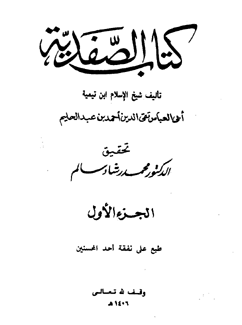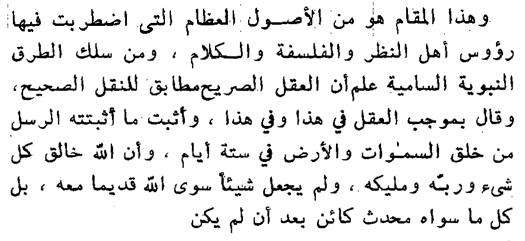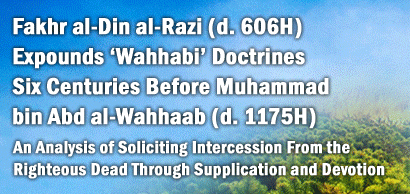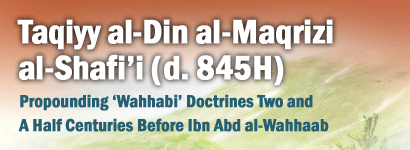 |
You are here:
Introduction
Shaykh al-Islam Ibn Taymiyyah Corroborates That Everthing Besides Allaah is Originated, Has a Beginning and Is Preceded by Its Own Non-Existence - Kitab al-Safadiyyah
 This matter is stated in abundance by Ibn Taymiyyah in many of his famous and well-known works, such that none can claim to be ignorant of this fact. We will cite here from the book al-Safadiyyah (tahqiq Muhammad Rashad Salim, 1406H). This monumental book of Ibn Taymiyyah is a refutation of the Philosophers on two matter. Firstly, their claim that the miracles of the Prophet are merely manifestations of the strength of inherent faculties and secondly, their claim that the universe is eternal. A fair share of the book is dedicated to this latter affair, even if the main aim of the book was to address the first issue. This book is mentioned as a work of Ibn Taymiyyah by numerous authorities, from them al-Safadi in al-Waafi bil-Waafiyaat, Ibn Rajab al-Hanbali, Ibn Abd al-Haadi (student of Ibn Taymiyyah) amongst others, and Ibn Taymiyyah himself makes reference to it a number of his other works. Here we present a sample of is very clear and explicit statements in the particular matter at hand. This matter is stated in abundance by Ibn Taymiyyah in many of his famous and well-known works, such that none can claim to be ignorant of this fact. We will cite here from the book al-Safadiyyah (tahqiq Muhammad Rashad Salim, 1406H). This monumental book of Ibn Taymiyyah is a refutation of the Philosophers on two matter. Firstly, their claim that the miracles of the Prophet are merely manifestations of the strength of inherent faculties and secondly, their claim that the universe is eternal. A fair share of the book is dedicated to this latter affair, even if the main aim of the book was to address the first issue. This book is mentioned as a work of Ibn Taymiyyah by numerous authorities, from them al-Safadi in al-Waafi bil-Waafiyaat, Ibn Rajab al-Hanbali, Ibn Abd al-Haadi (student of Ibn Taymiyyah) amongst others, and Ibn Taymiyyah himself makes reference to it a number of his other works. Here we present a sample of is very clear and explicit statements in the particular matter at hand.
Ibn Taymiyyah wrote (al-Safadiyyah, 1/21):
 And this is from that by which the futility of their saying about the eternity of the universe is made clear, and a clarification that everything that is besides Allaah is originated, [coming to be] after it was not. And this is from that by which the futility of their saying about the eternity of the universe is made clear, and a clarification that everything that is besides Allaah is originated, [coming to be] after it was not.
He also wrote (1/14):
 However, that which the [revealed] books and messengers spoke with is that Allaah is the creator of every single thing, so whatever is besides Allaah from the planetary orbits, the angels and other than that, it is all created (makhlooq), originated (muhdath), coming to be after not existing, preceded by its own non-existence. And there is nothing [present] in the universe alongside Allaah anything eternal with His eternity, neither the planetary orbits, nor the angels - irrespective of whether they are called intellects or souls or not. However, that which the [revealed] books and messengers spoke with is that Allaah is the creator of every single thing, so whatever is besides Allaah from the planetary orbits, the angels and other than that, it is all created (makhlooq), originated (muhdath), coming to be after not existing, preceded by its own non-existence. And there is nothing [present] in the universe alongside Allaah anything eternal with His eternity, neither the planetary orbits, nor the angels - irrespective of whether they are called intellects or souls or not.
And also (1/71):
 And we shall explain the futility of their evidence for the eternity of the universe upon this other consideration... And we shall explain the futility of their evidence for the eternity of the universe upon this other consideration...
And also (1/79):
 And this is a noble evidence for the origination of everything besides Allaah, absolutely, and it is built upon correct foundational principles which are acknowledged by the Philosophers and others besides them. And this is a noble evidence for the origination of everything besides Allaah, absolutely, and it is built upon correct foundational principles which are acknowledged by the Philosophers and others besides them.
And also (1/146-147):
 And this arena [of discussion] is from the mighty principles in which the chiefs of the people of inspection, philosophy and kalam have stumbled. Whoever traversed the lofty prophetic path will know that sound reason agrees with authentic revealed text, and he will speak in accordance with the necessity of reason in this [affair] and in that [affair], and he will affirm what the Messengers affirmed of the creation of the heavens and earth in six days, that Allaah is the Creator of everything, its Lord and its Owner, and that He never made anything besides Allaah to be eternal alongside Him. Rather, everything besides Him is originated, coming to be after not being... And this arena [of discussion] is from the mighty principles in which the chiefs of the people of inspection, philosophy and kalam have stumbled. Whoever traversed the lofty prophetic path will know that sound reason agrees with authentic revealed text, and he will speak in accordance with the necessity of reason in this [affair] and in that [affair], and he will affirm what the Messengers affirmed of the creation of the heavens and earth in six days, that Allaah is the Creator of everything, its Lord and its Owner, and that He never made anything besides Allaah to be eternal alongside Him. Rather, everything besides Him is originated, coming to be after not being...
This is only a small sample of the abundance of what is found in this great work and excellent refutation of the secular atheist Philosophers and their baseless views that oppose both sound reason and authentic revelation. As for the Ahl al-Kalaam, when they resorted to the conceptual language and tools of the Philosophers themselves in devising their proof (huduth al-ajsaam, the origination of bodies - see this article, better still, read the entire series), they were forced, in order to remain consistent with their proof, to deny Allah's names, attributes and actions, to varying degrees. However, they were all united in denying that Allaah has speech and action tied to His will and power, in other words Allaah's chosen actions (af'aal ikhtiyaariyyah). Because of this, they were unable to satisfactorily refute the atheist Philosophers, despite make a display of pomp and glitter of it.
Link to this article: Show:
HTML Link •
Full Link •
Short Link
Share or Bookmark this page: You will need to have an account with the selected service in order to post links or bookmark this page.







|
|
|
Related Articles:
Add a Comment
You must be registered and logged in to comment.
|
 |




|
 |








 This matter is stated in abundance by Ibn Taymiyyah in many of his famous and well-known works, such that none can claim to be ignorant of this fact. We will cite here from the book al-Safadiyyah (tahqiq Muhammad Rashad Salim, 1406H). This monumental book of Ibn Taymiyyah is a refutation of the
This matter is stated in abundance by Ibn Taymiyyah in many of his famous and well-known works, such that none can claim to be ignorant of this fact. We will cite here from the book al-Safadiyyah (tahqiq Muhammad Rashad Salim, 1406H). This monumental book of Ibn Taymiyyah is a refutation of the  And this is from that by which the futility of their saying about the eternity of the universe is made clear, and a clarification that everything that is besides Allaah is originated, [coming to be] after it was not.
And this is from that by which the futility of their saying about the eternity of the universe is made clear, and a clarification that everything that is besides Allaah is originated, [coming to be] after it was not.








